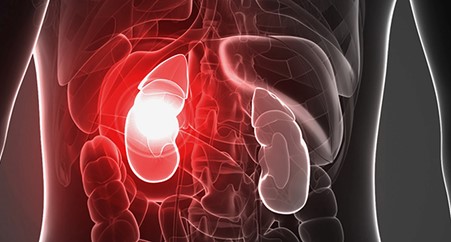The human body consists of a pair of kidneys located on each side of the spine. Kidneys are bean-shaped organs located in the lower abdomen and protected by the last two ribs.
Each kidney is about 4 to 5 inches long and roughly the size of a large fist.
The weight of the kidney is about 160 grams and receives about 20% of the total blood supply of the body.
Function of kidney
The main function of the kidney is to filter blood. Kidneys filter all the waste from the body and eliminate these toxic chemicals in the form of urine.
Kidneys also play a vital role in the process of urination. Kidneys play a vital role in controlling acid-base balance, and water balance, the kidney also maintains blood pressure and produces a hormone named “Erythropoietin” and active vitamin D. Nevertheless kidneys play a pivotal role in the removal of toxins from the body.
Kidney diseases
When kidneys cannot perform their functions properly, this is termed kidney disease.
A diabetic patient and a high blood pressure patient are at greater risk of kidney problems.
Symptoms of Kidney diseases:
- dry and itchy skin
- increased urination
- blood in the urine
- swelling on feet and ankles
- kidney patients feel more tired and have less energy to perform functions.
Loss of kidney functions can cause a buildup of fluid body waste or electrolyte problems.
Some major indications of a kidney problem include:
- loss of appetite
- muscle cramp
- high blood pressure
- chest pain
- vomiting
- fatigue
- weakness
Causes of kidney diseases
Chronic kidney disease occurs when minor and small infections are not treated properly.
There are many risk factors for chronic diseases of the kidney. These factors include:
- diabetes
- high blood pressure
- heart diseases
- smoking
- obesity
- abnormal kidney structure
- aging
Chronic kidney disease
The most common form of kidney disease is chronic kidney disease. This is a long-term disease and does not improve over time. This disease is caused by high blood pressure.
High blood pressure is very injurious to health because it can lead to deterioration of kidney functions and kidneys will no longer perform their functions. Patients with this disease need dialysis regularly.
Urinary tract infection
Urinary tract infections (UTIs) are bacterial infections of many parts of the urinary system. Bladder and urethral infections are very common. If left untreated, these infections will spread to the kidney and lead to kidney failure.
Kidney stones
Kidney stones are very dangerous. These are formed by the accumulation of oxalate and Tomatoes are a natural source of oxalate. Minor stones can be treated by drinking a large amount of water, but large stones are broken down by lithotripsy.
Kidney failure
Sometimes kidneys are damaged and cannot perform their proper function. This results in kidney failure. There is no treatment for kidney failure and a kidney transplant is the only way to save the life of the patients.
Preventions
Kidney patients must avoid rice, legumes, spinach, tomatoes, and fruits like bananas.
